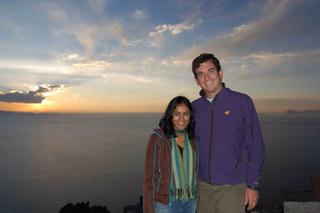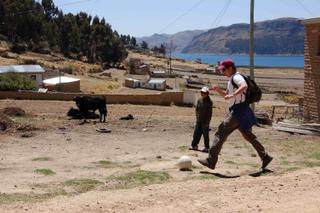Los Glazers
Musings from a young couple living in Bolivia
Wednesday, October 05, 2005
La Mano Dura
Bolivian government typically alternates between liberal democracies that implode due to corruption, disenfranchisement of the masses, and ultra-weak and untrusted institutions and the repressive military dictatorships that seize power to tidy everything up.
I began my classes at La UPSA under the former model: I am going to give each student freedom to pursue stories that interest them out in the city. Unlike my predecessors, I am going to eschew theory and compositional dogma and embrace unconventional storytelling to help loosen up writing muscles by embracing experimentation and interactive class discussions. I will use what little pull I have here to bring weekly guests to the class who can discuss first hand the problems that Bolivia faces.
The result: Mass student no-shows on the days I invite guests, no homework assignments handed in, whining about how the city is too dangerous to report on, and silence during attempts at classroom debate.
Well, the new regime is here. And the purge is on.
During an exam yesterday, one that I had to postpone because of a general strike closed the university the day it had been planned, I caught several students talking. They expressed shock, I mean real shock, when I told them to shut up and threatened to fail them. I also failed students who didn't turn in assignments on deadline.
Sound basic?
I think I may be the first teacher they've had who actually made them follow rules. And La UPSA is widely regarded as one of Bolivia's best universities. Yikes.
Monday, October 03, 2005
Caution when using Thomas Friedman aphorisms

The point of the story was to explain how Bolivian newspapers fail to explain complicated politics beyond the back and forth. I wanted to coax the reporters from Las Yungas in attendance to pick up where their colleagues had left off. But my attempt at folksy wisdom missed like a fruit bat hunting for guava in an orange grove before sunset.
I began my talk about journalistic responsibility with an apocryphal story about how I arrived to Spain 10 years ago not knowing anything about soccer. My friends, I said, had invited me to watch games with them. But being a gringo, I was lost trying to figure out who had the ball and what offsides and stoppage time meant.
Only after a few weeks of watching the games and consulting my patient and knowledgeable friends was I able to learn the game and even choose a team -- Real Madrid.
Now in Bolivia I feel lost again, I told my class. Only this time I'm lost in Bolivian politics and am without patient friends or newspapers to help me through the thicket.
Are the elections on or off? What does state autonomy mean in the context of Bolivia? Why is everyone on a hunger strike? No answers in local newspapers or television. No one knows the answers.
Such satisfaction when the some 40 participants nodded in agreement.
It was a warm feeling that frosted over during the question and answer period, when a male radio reporter beckoned for the floating microphone.
"Senor Andrew," he said, his eyes squinted in an expression that I read as sympathetic. "You said it took you four weeks to pick a soccer team. Don't worry. You will pick a political party to support in even less time."
(Take a look at the snowcapped mountain in the background: Maybe that's why they seemed so interested in what I was saying.)
Counters











